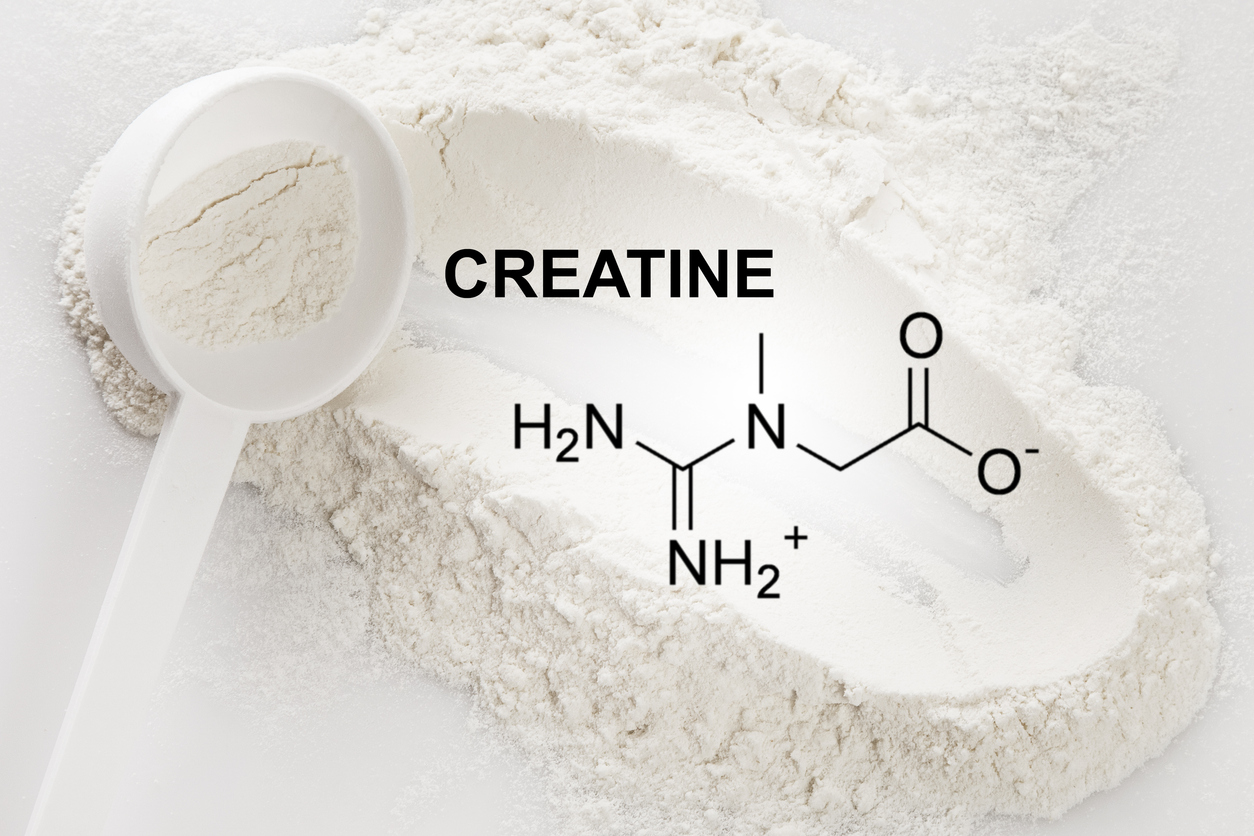The world first met Popeye the Sailor in a comic strip on January 17, 1929. In those early days, he got his giant forearms and superhuman strength by rubbing the head of a lucky chicken. By 1933, spinach had replaced the fowl as the font of Popeye’s fighting prowess, leading to a 33% increase in consumption of the vegetable in the US.
However, those who added spinach to their diets to gain Popeye’s superhuman strength and ridiculously exaggerated muscles were probably disappointed. Despite being an awesome leafy green, spinach doesn’t have the ability to increase muscle size or power.
Nearly a century later, there’s another substance touted in the health and fitness worlds for its potential to enhance exercise performance and muscle mass. It’s often used by athletes and bodybuilders and is present in the majority of sports supplements sold in the US.
And not only that, but it also may have other health benefits that have nothing to do with lifting heavy weights and sculpting muscles.
The substance in question is creatine (in case you skipped the headline of this article, and my attempt at building suspense is actually working).
We make creatine in our bodies, and so do animals — which is why omnivores get additional creatine in their diets when they consume meat. Which begs several questions for plant-based eaters: “Am I getting (or making) enough creatine? Should I supplement? Which are the best vegan sources of creatine? And is it safe?”
Let’s flex our mental muscles and do a deep dive into the science of creatine.
What Is Creatine?

Creatine is a naturally occurring compound made up of amino acids. It’s not one of the essential ones that you need to get from food because your body can and does synthesize it from the amino acids arginine, glycine, and methionine. While arginine and glycine are produced naturally in the body, independent of your food intake, methionine does need to be obtained through food.
Creatine is part of the family of guanidine phosphagens (no relation to any characters from a science fiction movie), which specialize in storing high-energy phosphate bonds that your body can use when there’s a sudden need for energy. It’s used primarily by muscle and nerve tissues, which have high and fluctuating energy demands.
Creatine is technically a “non-protein amino acid,” which I had to look up because I hadn’t seen the term before. Basically, it means that creatine doesn’t take part in protein formation, but rather mostly works to support and boost the energy system. It also has a side hustle as an antioxidant.
Your body produces about one gram of creatine each day — unless you have a rare creatine synthesis disorder. It gets stored in your muscles as phosphocreatine and gets broken down into creatinine with use.
There are a lot of factors that can influence your serum creatinine levels, including gender, age, weight, lean body mass, and how much protein you consume. If you have elevated levels of creatinine in your blood, that might indicate kidney disease since one of your kidneys’ jobs is to remove creatinine and other waste products from your bloodstream.
Omnivores typically have about 20–30% more creatine in their body than vegans and vegetarians because, in addition to what their bodies make, they also consume some from animal sources such as meat and seafood.
Creatine Benefits and Uses
Creatine is marketed as a performance-enhancing supplement for athletes and people who want big muscles. This reputation can obscure the fact that creatine can also have potential benefits for people of all ages and sizes, and that it may, in fact, be especially helpful for elderly people and for plant-based eaters.
Creatine and Exercise Performance

Your muscles get most of their energy from a compound called adenosine triphosphate, which students of high school biology know by its hip nickname, ATP. When you exercise, your muscles use up ATP faster, which is one of the reasons you can’t do an infinite number of push-ups.
Studies show that creatine supplementation can speed up your body’s ability to make more ATP, especially between sets of high-intensity exercise. This can improve performance, particularly in activities with a relatively short time duration.
For example, studies of soccer players who took creatine found that it improved their sprinting, jumping, dribbling, and agility, but didn’t affect their endurance.
Creatine also can provide a competitive edge in short-duration sports that include a sprint at the end of an event, such as rowing, kayaking, track cycling, and running races.
Creatine not only improves performance during exertion, but it also helps people who do resistance training gain more muscle from the same amount of exercise. You don’t have to want to look like Mr. or Mrs. Olympia to benefit from increased muscle mass either. Sarcopenia (loss of skeletal muscle mass) is one of the most harmful side effects of aging, and is associated with increased risk of injury, disability, and death.
Combining weight training with creatine may help prevent, lessen, and delay skeletal muscle loss.
Creatine and Heart Health
One of the risk factors for heart disease is elevated blood levels of an amino acid called homocysteine, which has nothing to do with a certain famous Italian chapel. Elevated homocysteine levels can damage blood vessel linings, promote blood clots, and contribute to atherosclerosis, increasing the risk of heart attack and stroke, among other nasty party tricks.
Vegans may have an increased risk of elevated homocysteine if they don’t supplement with vitamin B12, which helps break down the amino acid. A 2019 study found that vegans given creatine supplements were able to lower their homocysteine levels due to creatine’s role as a potential antioxidant.
What’s more, they improved an important marker of vascular health called microvascular vasodilation, which refers to the widening of small blood vessels (microvessels) such as arterioles and capillaries. Better vasodilation improves blood flow, reduces blood pressure, and protects against ischemic conditions (where blood supply is restricted and can lead to a heart attack or stroke).
There’s also some evidence to suggest that creatine supplementation could support heart metabolism and heart health, especially during ischemic challenges such as heart attack or stroke.
Creatine and the Brain

While most of the creatine in your body is stored in your muscles, about 5% of it lives in and gets used by the brain. Studies have shown that creatine supplementation can improve performance in a number of cognitive tasks that researchers like to measure in laboratories, including random number generation, forward and backward recall, long-term memory, visual reaction time, cognitive effort, and dynamic balance. It also enhanced the study participants’ mood state.
A 2020 study found that creatine supplementation reduced mental fatigue in people asked to perform mentally tiring tasks such as the Stroop test.
Fun tangent: This is where people are shown color words (RED, BLUE, YELLOW, etc.) printed in ink of a different color than the word, and they have to say, out loud, the color of the ink (and not the name of the word). It’s surprisingly difficult. Here’s an example if you want to try it.
A 2017 study also gave a battery of cognitive assessments to people with bipolar disorder, some of whom were given supplemental creatine. Those taking creatine performed better on a test of verbal fluency.
And finally, a 2022 meta-analysis of eight published studies found that supplemental creatine improved memory — a bit — in older adults, in some cases in as few as five days. However, as researchers are fond of saying, “More research is needed,” as several of the studies included in the meta-analysis weren’t of the highest quality.
Creatine and Immunity
There’s evidence that creatine can support your immune system, too. So far, the research on humans has been limited to looking at the production of certain substances and the expression of receptors that help detect infections. The more robust evidence comes from studies of rodents. (Our view on the use of animals in medical research is here.)
A 2022 mouse study found that creatine supplementation can enhance the immune responses of a type of white blood cell (called neutrophils) that fights bacterial infections. The mice who had creatine had a better immune response, lower levels of pro-inflammatory cytokines, reduced bacterial colonization in their organs, and increased survival rates.
A 2023 study that also used mice found that creatine boosted the ability of macrophages to fight tumor growth. It did so by giving them more energy, via ATP.
Creatine and Bone Health

Creatine supplementation may also enhance the health of your bones, especially as you age. In a 2015 study, 47 postmenopausal women were put in a supervised resistance training program for a year. The group was divided randomly, with half of them taking creatine supplements while the other half took a placebo. In addition to getting stronger at the bench press, by the end of the 12-month study, the creatine-taking group was also found to have more bone mineral density and better bone bending strength.
Unfortunately, however, most of the studies on creatine and bone health have small sample sizes and suffer from other design flaws. So there is enough evidence to think that it could help — but we don’t know for sure.
In any case, improvements in bone health may not be an independent effect; rather, it might be a downstream outcome of creatine’s ability to preserve muscle mass. That is, we know that building skeletal muscle through resistance training also improves bone density, so it’s possible that improvements in bone density from creatine supplementation are a secondary effect.
Can Plant-Based Eaters Get Enough?
Just like us, animals store creatine mostly in their muscles. And when humans eat animal muscle, they consume the creatine that it contains. Infants get their creatine from their mother’s milk or from milk-based formula (but not from soy-based ones).
Since plant-based eaters who don’t take a supplement and who completely avoid meat and fish only have the creatine their bodies produce, it’s reasonable to wonder if they’re getting enough.
Indeed, studies show that vegetarians usually have lower plasma and muscle creatine levels than omnivores — about 20–30% lower, in fact.
Interestingly, while plant-based eaters who don’t consume creatine have lower plasma and blood levels of creatine, they have about the same brain levels.
It appears that the brain depends on its own creatine synthesis, and doesn’t take a chance on getting it from diet — which makes sense, considering how beneficial creatine is for cognitive health.
So how much creatine do we need? Depending on diet, muscle mass, and physical activity levels, it’s often recommended that an average-sized person should get 2–3 grams of creatine per day in order to maintain optimal creatine stores and promote general health.
Hmmm — let’s do some math. Most of us need 2–3 grams per day, and our bodies make about 1 gram per day. I’m no Isaac Newton, but according to my calculations, that means plant-based eaters might have only one-half to one-third of the recommended amount of creatine.
We don’t know if this really is a problem. But given all we do know about the benefits of creatine, it might be a good idea for plant-based eaters — and possibly other folks, too — to consider supplementation.
Creatine Supplements

There are several forms of supplemental creatine.
- Creatine monohydrate
- Creatine salts
- Effervescent creatine
- Creatine ethyl ester
- Buffered creatine
- Creatine nitrate
- Creatine dipeptides
- Creatine serum and beverages
Yikes — that’s a long and confusing list.
I’m going to make it easy for you: the most common and most highly recommended type is creatine monohydrate. Nearly all the research on creatine’s impact on athletic performance has used this formulation. And there’s no evidence that any of the other forms are superior.
In fact, most studies indicate that other forms of creatine have less physiological impact on muscle creatine levels and performance compared to creatine monohydrate. They contain less creatine per gram than creatine monohydrate, which is also the only formulation deemed GRAS (“Generally Regarded As Safe”) by the US Food and Drug Administration.
You can get creatine monohydrate in powder, capsule, and gummy forms.
Who Might Want to Supplement?
There are several categories of people for whom supplementing with creatine might be beneficial.
Plant-Based Eaters

As we’ve seen, vegetarians have creatine stores 20–30% lower than those of nonvegetarians. In people with a lot of muscle mass, those stores are depleted more rapidly. And people who are more physically active (especially plant-based eaters) need to replenish their muscles with ATP more frequently.
The reality is that vegetarians and vegans are more likely to benefit from supplements because they’re starting at a bit of a deficit compared to meat eaters.
Creatine for Athletes
Athletes, whether plant-based or not, may be able to improve performance with supplemental creatine. In most (but not all) studies, creatine supplementation has helped athletes become stronger and more powerful.
As we’ve seen, creatine has often been shown to increase performance and accelerate muscle recovery. And it can enhance your body’s capacity to do anaerobic work (the kind that leaves you gasping for breath and that you can keep up only for a few seconds) through repeated repetitions.
People Under Chronic or Acute Stress

Creatine may also protect your body by reversing some of the harmful effects of stress on your mitochondria (the “power stations” located in your cells that produce the energy they need to function).
Creatine may act like a kind of antidepressant, and there’s some evidence that people with stress-related psychiatric disorders may benefit from supplementation. However, this has been most comprehensively studied in animals, not humans.
People with CCDS
Also, there’s a pretty rare group of conditions called cerebral creatine deficiency syndromes (CCDS). People with one of these conditions have a genetic mutation that causes a deficiency in an enzyme that is needed to synthesize creatine or its precursors.
Symptoms of CCDS can include “developmental delays, mental retardation, speech impairment especially affecting active language, seizures, extrapyramidal movement disorder, and autism spectrum disorder.”
CCDS patients are typically prescribed oral supplements of creatine monohydrate, along with another amino acid called l-ornithine.
How Much Creatine Is Recommended?

For athletes, many professionals recommend a two-step approach to creatine monohydrate supplementation: a five to seven day loading phase followed by a maintenance phase. In the loading phase, you’d consume 20 grams per day, either all at once or split into 4 daily doses of 5 grams each. In the maintenance phase, you consume three to five grams per day.
If you’re not in a rush to increase your creatine stores, you can skip the loading phase and jump right into the maintenance dose.
There’s some evidence that your muscles will absorb more creatine when it’s consumed around the same time as carbohydrates and protein. And in terms of timing, consuming creatine after your workout seems to be more effective than taking it beforehand.
If you’re wondering how long you can safely take creatine monohydrate, we have data that didn’t find any problem (in adults) for up to five years. That doesn’t mean it isn’t safe for longer than that — rather, there just aren’t longer-term studies yet.
Potential Downsides of Creatine Supplements
There are a couple of reasons to exercise caution — or at least discernment — when considering creatine supplementation.
First, some brands have been found to be contaminated with heavy metals and other contaminants. In 2011, researchers found contaminants in 44% of the creatine supplement samples they tested, including heavy metals like mercury and lead.
To avoid consuming dangerous toxins, look for creatine supplements that are independently tested (ideally, they should publish their test results on their website), and/or USP verified.
Creatine and Kidney Disease

One of the cautions that athletes often hear from trainers and coaches is that too much creatine can damage the kidneys. There have been a lot of studies on the effect of creatine supplementation on kidney function, and the evidence suggests that for most people who are taking modest doses of three to five grams per day, there isn’t really a cause for concern.
What may actually be happening is that the supplement can temporarily increase serum creatinine levels, which might be misinterpreted as an indication of kidney disease. That’s because health care providers typically measure kidney function with a blood test for creatinine.
The problem with the creatinine blood test is that it can’t really distinguish between elevated blood creatinine levels that are a red flag for kidney problems and elevated levels caused by creatine supplementation, having lots of muscles, and/or just plain working out hard.
If you’re concerned about your kidney health, there’s an alternative way to assess kidney function. It’s a blood test for cystatin C, which can give more reliable results because it’s less subject to healthy and normal creatinine fluctuation.
One word of caution: although creatine supplementation appears to have no harmful effects on kidney function in people without underlying kidney disease, it’s still possible that it could be problematic for people with preexisting kidney disease.
Strengthen Your Health with Creatine
Creatine has long been highlighted in health and fitness conversations for its potential benefits to enhance exercise performance and muscle mass. And now it’s also being explored for other health benefits, such as supporting brain health, cardiovascular function, bone strength, and immune health. While omnivores can get it from food, plant-based eaters cannot — and may have suboptimal levels.
As a result, many people, and especially plant-based eaters, may benefit from supplementation. There are a few safety considerations, and there is always more to learn. Still, based on what we know now, the most common form of creatine, creatine monohydrate, is considered safe and beneficial for general health and disease prevention. And if you do choose to take it, it’s wise to get it from a source you can trust so you can avoid possible heavy metal contamination.
Tell us in the comments:
- Have you tried taking creatine supplements? If so, what did you experience?
Featured Image: iStock.com/RHJ



